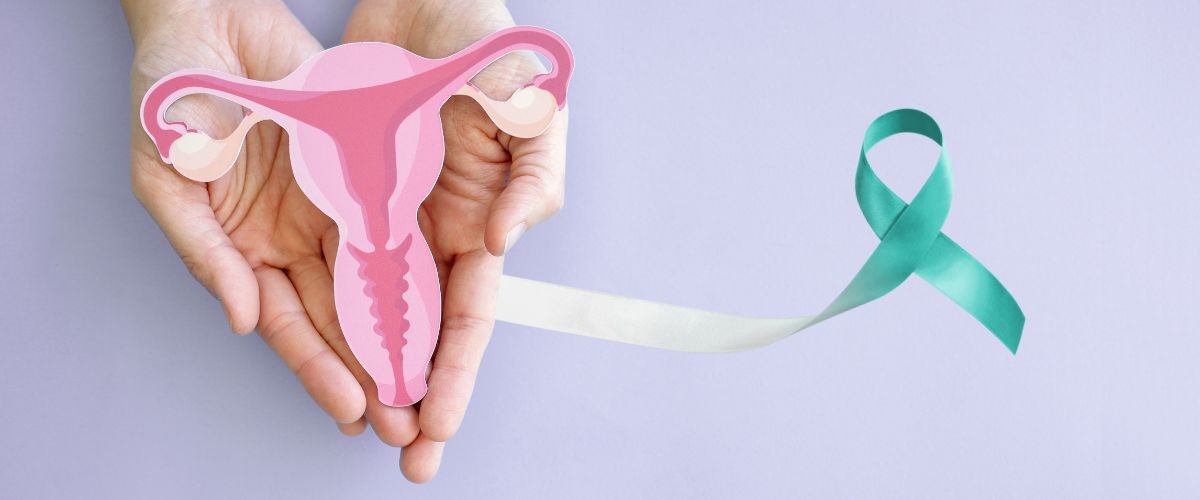Kirsten’s cervical cancer survivor story
For Cervical Cancer Awareness Month, Vitality member Kirsten Randerson, opens up about her diagnosis and the importance of screening

Following a routine smear test, Vitality employee, Kirsten Randerson got the result that no woman wants to hear.
She was diagnosed with cervical cancer, with a four-centimetre-high tumour in her cervix, which would have to be removed by a radical hysterectomy.
As well as the removal of her ovaries and 18 pelvic lymph nodes, the procedure – which involved seven hours of surgery – would medically induce her into early menopause.
Receiving her diagnosis at the height of the Covid-19 pandemic in November 2021, also meant that she would have to go alone to all hospital appointments, and for the surgery itself.
A pragmatist at heart, though, Kirsten took the diagnosis in her stride; she carried on going to work in the lead up to the operation and was determined to stay positive throughout the whole experience.
“I remember the nurses saying to me that I was taking it [the diagnosis] really well, but I didn’t know how I was supposed to react,” she tells Vitality.
“I just said, you tell me what I’ve got to do, and I’ll do it.”
The surgery was a success, and after a five-day stint in hospital, she was able to return home to her family.
Now, it was time for the recovery process from her surgery – as her cancer was isolated to her cervix, she wouldn’t have to go through any other treatment.
"Everybody I meet now, even on a dog walk, I ask them if they’ve had their smear test recently."
Kirsten Randerson, Vitality member
But as someone who refers to herself as a “rubbish patient” and an active person with two young children and a teenager, Kirsten wasn’t used to slowing down.
“Allowing myself time to recover was the hardest part for me,” she recalls.
“I don’t like being ill and I didn’t want to have to rest and not be able to do my normal routine.”
A keen walker, she was limited to just 15 minutes of movement a day, and on doctor’s orders, she was told to rest up.
And it was this time, during her recovery, that Vitality was able to offer extra support.
‘My safety net’
As a Vitality team member, Kirsten was already familiar with its in-house Oncology team.
But she never knew how valuable they would be as part of her Cancer Cover, which was offered through her health insurance.
After telling Vitality about her diagnosis, she was assigned a Care Consultant – who would be her own personal contact at Vitality for the duration of her treatment.
From there, she was referred to the Vitality Cancer Support programme, powered by Alvie Health, who connected with her ahead of her surgery.
If you have health insurance with Vitality, you can access care fast at a time that is convenient for you through Care Hub. Log into Member Zone for more information.
“I had them [the Vitality Cancer Support programme] as my safety net, my blanket, that could offer me psychological help when I needed it after the surgery,” she explains.
“Being able to connect through the programme app fitted in nicely with my lifestyle and the children. When I had questions that weren’t right to call the hospital, I could message Adele [her Care Consultant] in the middle of the night, and she would pick that up in the morning.”
Now that she was going through the menopause, she was directed to the Peppy app – a Vitality partner – that offered her support in dealing with early onset menopause.
She was also put in touch with a nutritionist, through Vitality’s Cancer Treatment Support Programme, powered by Alvie Health, which gave her 1-2-1 advice on what to eat, following the operation through the app.
And it wasn’t just Kirsten’s private medical insurance that offered help with her recovery; the NHS also supported her with a fitness programme to help her get back into exercise through her local gym.
‘Smear mad’
Now a huge advocate for smear testing, she’ll regularly talk to people – even strangers! – about keeping up to date on health checks and regular screening. “I do think people think I’m a little bit smear mad,” she confesses.
“Everybody I meet now, even on a dog walk, I ask them if they’ve had their smear test recently.”

But as a person who had always had regular screenings, Kirsten admits she was frightened by her diagnosis after a normal result three years’ prior.
“Within that three-year period, I managed to develop cervical cancer,” she says.
“I don’t want people to get scared if they haven’t gone for their smear test and put them off going, but if I hadn’t gone for my smear test, I would have been in a much worse scenario if I’d gone a year later, if I’d gone six months later.
“I know it’s not the most dignified thing in the world, but if you can catch it early, you could have a similar experience to me: going back to regular exercise and getting back to work as soon as possible.
“Life is very short and anything that you can do to prevent a diagnosis through routine tests.”
She’s even offered to go with colleagues if they’re nervous about going for their smear, as she has seen the importance of prevention and regular screening first hand.
Overcoming the stigma
But despite Kirsten’s passion to encourage women to be screened, findings from the Department of Health and Social Care show that 1-in-3 women are not taking up the offer of a regular smear test
The survey, done in partnership with the NHS, found that the most common reason for not attending a cervical screening appointment was due to embarrassment (42%).
Postponing booking an appointment and fears of the procedure being painful were also cited as reasons for women not attending a screening
The results triggered the launch of a national campaign to get more women to attend their cervical examinations, dubbed: Help Us Help You – Cervical Screening Saves Lives.
But Kirsten thinks people should treat a routine smear like any other check-up, be it an eye or ear test.
“Prevention is the most important thing in the world, and it takes such little of your time, but the outcome can save your life, there’s no two ways about it,” she adds.
Today, around 2,700 women are diagnosed with cervical cancer every year in England, but estimates have found that up to 83% of deaths due to cervical cancer could be avoided with regular screening, which shines a major spotlight on the importance of the NHS’s cervical screening programme
“And if you’re like me and you have to have surgery, you can come out the other side. That’s the other side of the story, that you can be cured you and you can carry on with your life after a diagnosis.”
At Vitality, we know that a cancer diagnosis can be incredibly hard on you and your family. That’s why we offer our health insurance members a range of added support with our Advanced Cancer Cover.
Through Vitality, you could get access to a physiotherapist, dietician, psychologist or a clinical nurse specialist, as well as other professionals, to help you through your diagnosis and recovery.
Vitality also rewards you for keeping up to date on your health checks, including smear tests.
Find out more information on how to earn points through regular health checks via Member Zone.
Related: 8 essential things you should know about smear tests
Recent articles

Vitality Ambassadors take local parkwalks by storm: How to join the fun
Stay tuned every week to find out which Vitality Ambassador is heading down to parkwalk at their local parkrun on Saturday

Let’s walk! Vitality and parkwalk join forces to help Brits build healthy habits
Vitality is encouraging more Brits to reap the benefits of walking by teaming up with parkrun’s walking initiative: parkwalk

Get the Zs you deserve: 6 common sleeping myths put to bed
Could falling for a common sleep myth be where we’re going wrong? This World Sleep Day, we’re setting the record straight so that you get the best from the land of nod

